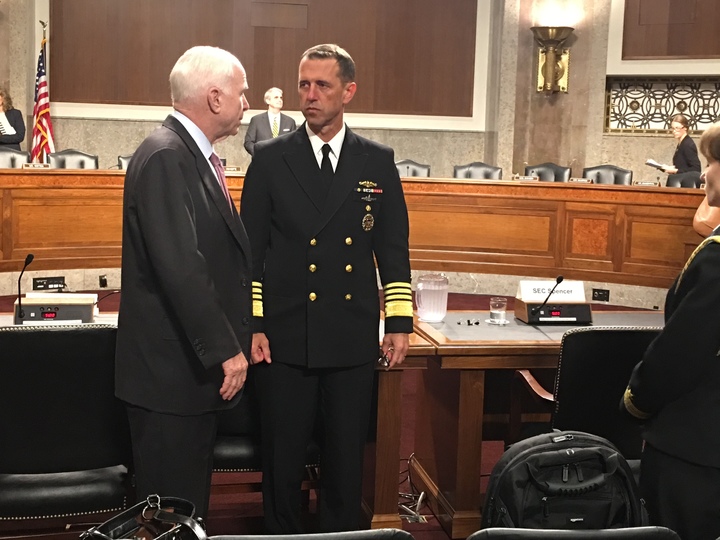WASHINGTON — After four Navy collisions within the past year resulting in the deaths of 17 seamen, Arizona Sen. John McCain on Tuesday told military officials he had arrived at a simple conclusion: sailors are being worked too hard.
“All you have to do is use common sense,” said McCain, chairman of the Senate Armed Services Committee and a Navy veteran. “I’m not sure we need a study…When somebody is working 100 hours a week, over an extended period of time, they’re going to make mistakes.”
A Government Accountability Office report presented as testimony cited a 2014 Navy study of a standard workweek that found sailors were on duty 108 hours a week. John Pendleton, the GAO’s director of defense capabilities and management, said sailors are expected to work only 81 hours per week. The GAO is the nonpartisan auditing arm of Congress.
The hearing came nearly two weeks after U.S. Navy officials and government auditors told the House Armed Services Committee that there were a multitude of problems facing the U.S. Seventh Fleet — including insufficient training and a lack of quality ship maintenance — that may have played a part in the collisions.
The most recent collision took place when the USS John S. McCain, a guided-missile destroyer named after the senator’s father and grandfather, collided with an oil tanker near Singapore on Aug. 21. Among the sailors killed in the collision was Kevin Sayer Bushell, 26, of Gaithersburg Maryland and Timothy Thomas Eckles Jr., 23 of Manchester, Maryland.
Two months earlier, the USS Fitzgerald, an Arleigh Burke-class destroyer, collided with a container ship near the Japanese coast. Seven U.S. sailors died as a result of the accident, including 24-year-old Xavier Alex Martin of Halethorpe, Maryland.
“They were patriots and will not be forgotten. We’re going to back our words with actions,” Secretary of the Navy Richard V. Spencer said in his Senate testimony. “We have a problem in the Navy and we’re going to fix it.”
Spencer said a Navy-wide comprehensive review would be complete by mid-October.
In 2015, Pendleton made 14 recommendations to the Department of Defense to improve the Navy’s preparedness. He said Tuesday the most important of those was to allocate “dedicated training time.”
As it stands, the Navy’s optimal 36-month fleet schedule includes 6.5 months of ship maintenance, 9.5 months of crew training, a 7-month deployment and 13 months of sustainment, or the provision of the necessary resources to prolong operation until a mission is completed, according to the Pentagon.
However, the Navy has struggled to adhere to that timeline since it was implemented in November 2014, according to Pendleton’s GAO report.
Slowed ship maintenance has led to what Pendleton called “a vicious cycle” because ships are required to stay on deployment for longer periods of time, placing a strain on sailors. The GAO reported that between 2011 and 2014, just “28 percent of scheduled maintenance for surface combatants was completed on time and just 11 percent on time for aircraft carriers.”
The report said that it would take “at least 19 years and a Navy-estimated $4.86 billion” to modernize the shipyards. The extended maintenance cuts into designated training time, which causes fleets to either train marginally or defer the training period altogether.
As a result, the Seventh Fleet, despite the fact that 37 percent of its ships’ certifications had expired, had operated under the assumption that it was always ready because it was perpetually in motion, Chief of Naval Operations Adm. John Richardson said.
Though McCain conceded that budget sequestration has been an issue for the Navy, he said the issue of overworked sailors is one that can be fixed immediately.
Richardson concurred.
“We’re going to leave no stone unturned,” he repeated several times. “I want to get these answers now, but I want to get them right.”
Richardson noted that extended work weeks for some officers resulted in a Sept. 16 mandate that they get enough sleep.
Richardson anticipated that it would take a serious culture change to mitigate the extended workweek, saying that the “can-do” attitudes of some sailors cause them to take pride in working long hours. The admiral likened the phenomenon to college students savoring their “all-nighters.”
McCain said he was pleased that the investigations into the collisions are underway, but reiterated that some of the issues, such as overworked sailors, should be addressed more quickly.
“As leaders of our Navy, you must do better,” said McCain, pausing after each word for emphasis. “It’s the bare minimum we owe to the young men and women who risk their lives.”

